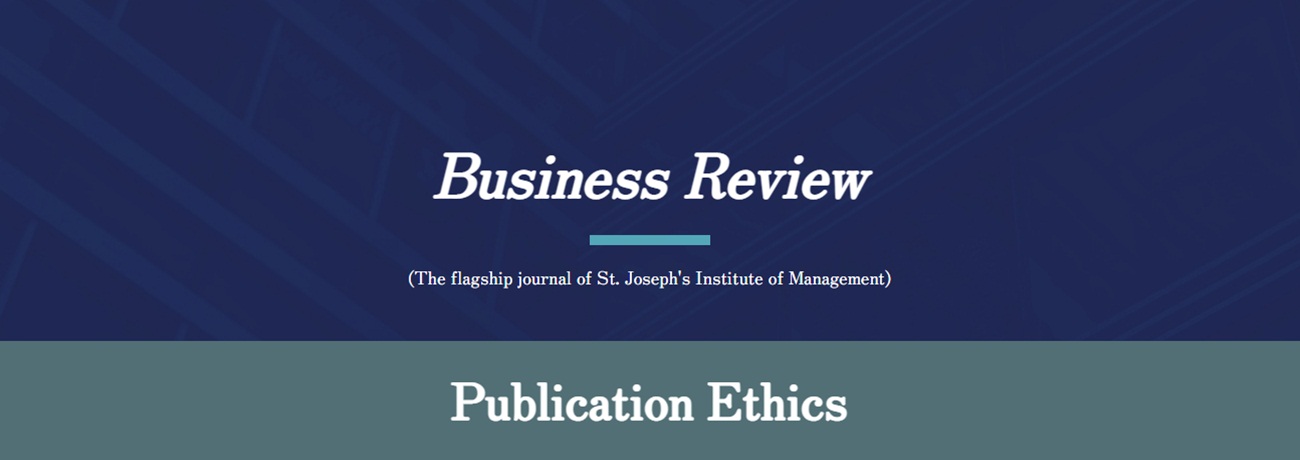Publication Ethics and Publication Malpractice Statement
Business Review adheres to the following two codes of the Committee on Publication Ethics (COPE): the Code of Conduct and Best Practice Guidelines for Journal Editors and the Code of Conduct for Journal Publishers. The journal’s editor, reviewers, authors and publisher is committed to the code. Key points of these codes are summarized below.
∎ The editor evaluates submitted manuscripts exclusively on the basis of their academic merit (study’s validity and rigor) and its relevance to the journal’s scope. The journal
does not discriminate with regard to the authors’ race, gender, sexual orientation, ethnic origin, citizenship, religious belief, political philosophy or nationality.
∎ The editor and editorial staff will not disclose any information about a submitted manuscript to anyone other than the corresponding author, reviewers, potential reviewers,
other editorial advisers, and the publisher, as appropriate.
∎ The editor, editorial staff, editorial advisors and the publisher will not use unpublished information disclosed in a submitted manuscript for their own research purposes
without the authors’ explicit written consent.
∎ All submitted manuscripts being considered for publication undergo double blind peer-review by at least two reviewers. The editor is responsible for deciding which of the
manuscripts submitted to the journal will be published, based on the validation of the work in question, its importance, the reviewers’ comments, and legal requirements
such as those regarding libel, copyright infringement and plagiarism.
∎ The editor (in conjunction with the publisher and/or society) will look into every reported act of unethical publishing behavior with regard to a submitted manuscript or published
paper, even if it is discovered years after publication. If, on investigation, unethical behavior is uncovered, a correction, retraction or an expression of concern will
be published in the journal.
∎ Any invited referee who feels unqualified to review the research reported in a manuscript or knows that its prompt review will be impossible should immediately notify the editor.
∎ Reviewers must carry out their work objectively, and their observations must be formulated clearly with supporting arguments and citations from extant literature, so that authors
can use them for improving the manuscript. Personal criticism of the authors is never appropriate.
∎ A reviewer must notify the editor of any substantial similarity or overlap between the manuscript under consideration and any other manuscript
(published or unpublished) that he/she observes.
∎ Unpublished material disclosed in a submitted manuscript should not be used in a reviewer’s own research without the express written consent of the authors.
∎ Any invited referee who has conflicts of interest resulting from competitive, collaborative, or other relationships with any of the authors, companies or institutions
connected to the manuscript should immediately notify the editor and decline the invitation to review.
∎ Authors in the journal are expected to accurately describe results, followed by an objective discussion of the work. Review articles should be accurate and objective.
∎ Authors' manuscripts should contain sufficient detail and references to allow others to replicate the work.
∎ Authors may be asked to provide the raw data for editorial review and from other competent professionals for at least 3 years after publication.
∎ Authors should ensure that they submit only entirely original works, and if they have used the work and/or words of others, that this has been appropriately cited.
∎ Submission of a manuscript concurrently to more than one journal is prohibited.
∎ Authors should, at the time of submission to this journal, disclose any conflicts of interest that might influence the results or their interpretation. These conflicts of interest
may take the form of financial ones such as grants or other funding, employment, consultancies, or ownership, as well as non-financial ones such as personal or professional
relationships or other affiliations to the subject matter in the manuscript. All sources of financial support for the work must be mentioned along with the grant or
other reference number if any.
∎ Co-authors to a journal must have: (a) made significant contributions to the study; and (b) drafted the manuscript or revised it critically; and (c) have seen and approved
the final version of the paper and agreed to its submission for publication. All other persons who made substantial contributions to the work reported in the manuscript
(such as technical help, writing and editing assistance) but who do not meet the criteria for co-authorship should be acknowledged in the "Acknowledgements" section.
The corresponding author will ensure that all appropriate coauthors and no inappropriate coauthors are included in the author list.
∎ Authors are obliged to respond promptly to the editor's requests for raw data, clarifications, ethics approval, participant consents and copyright permissions. In the case of a first
decision of "review and resubmit", authors should respond to the reviewers’ comments systematically, point by point, and in a timely manner, resubmitting their manuscript
to this journal by the deadline.
∎ Submission of a manuscript concurrently to more than one journal is prohibited.
∎ In cases of possible scientific misconduct, plagiarism, or fraudulent publication, the publisher (with the editor), will take actions including investigation, publication
of clarifications or retraction.
∎ The publisher is committed to the availability of publications and will strive to ensure the content preservation and accessibility by attempting to partner with the
corresponding organizations.




